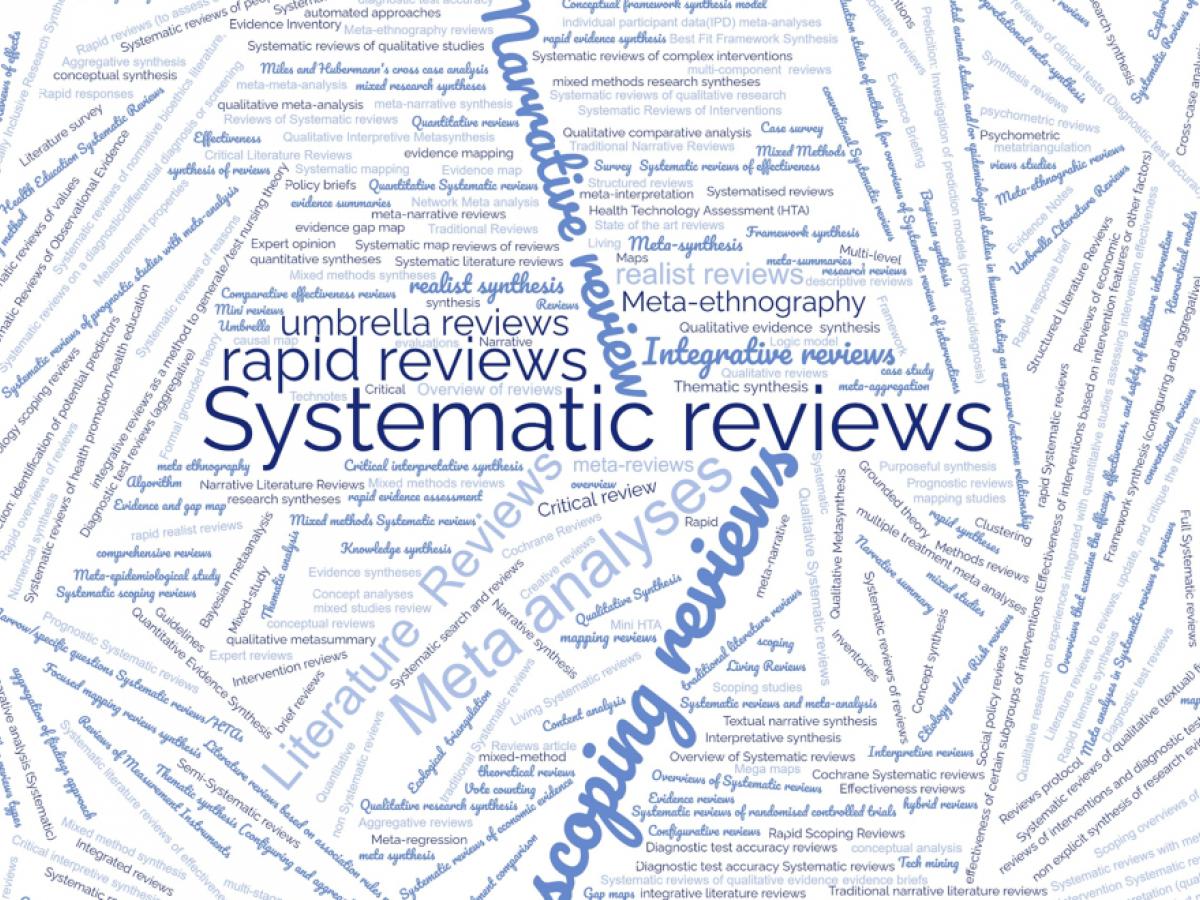What we offer
At HESRI, we are experts in guideline development, systematic (and scoping) reviews, and evidence implementation.
We work with a number of partners to support their evidence needs. Being expert methodologists, we produce excellent quality evidence, especially systematic reviews, scoping reviews, and other forms of evidence synthesis. Along with conducting research to improve methodology, we are available to take on consultation, develop public health guidelines for various organisations, and provide education and training.
-
Systematic reviews, scoping reviews and evidence synthesis
Our trained research methodologists have over 20 years of experience conducting evidence reviews for different organisations and partners. Our team includes Cochrane trained and published review authors and JBI trained and published review authors. Regardless of the size, scope and topic, or field, our researchers can conduct systematic reviews and other evidence synthesis products that meet the standards of internationally renowned groups such as Cochrane and JBI.
Whether the evidence reviews are to inform guideline development or are standalone products, our researchers can ensure that the right approach is tailored to your questions and needs. In terms of the field, our team can synthesise evidence in clinical/health sciences, pre-clinical research, public health, social sciences, environmental health and education. The types of Evidence Synthesis products we specialise in include:

- Comprehensive systematic reviews
- Rapid reviews
- Living systematic reviews
- Evidence briefs
- Scoping reviews
- Evidence and gap maps
- Mixed methods reviews
Our reviews can focus on questions related to the benefits and harms of interventions (sometimes called effectiveness reviews), qualitative evidence synthesis (focusing on experiences, opinions, attitudes, perceptions, beliefs, acceptability), prevalence/incidence/ burden of disease reviews, reviews of barriers and facilitators and implementation factors, diagnostic test accuracy reviews, prognostic/risk factor reviews, realist synthesis, health utilities reviews (preferences and values) and economic evaluations.
-
Guideline development, review and consultation
At HESRI we ensure that guidelines meet the standards for trustworthy evidence, such as those upheld by the National Health and Medical Research Council, the GRADE Working Group and the Guidelines International Network. We are experts in guideline development from start to finish. However, we tailor our involvement according to your needs. For example, we can lead the evidence review and guideline drafting process, act as methodologists on the panel, or provide advice and consultancy along the journey.

-
Education and training

As experts in research methodology, evidence-based healthcare, guideline development and systematic reviews we offer training programs to assist clinicians, decision makers, systematic reviewers and guideline developers to meet their goals. Our GRADE one-day workshop introduces the basics of GRADE for systematic reviews and guideline development. We are also able to provide workshops and training addressing the following topics as per your needs:
- Clinical guideline development methods
- The Grading of Recommendations, Assessment, Development and Evaluation (GRADE) Approach
- Systematic reviews, their importance and methodology with focus on:
- Reviews of interventions (including different approaches for meta-analysis)
- Scoping reviews
- Qualitative research synthesis
- Prevalence reviews
- Rapid reviews
- Prognostic reviews
- Risk of bias and critical appraisal
- Predatory publishing, error and fraudulent data and how we can deal with this as systematic reviewers
- Scoping reviews vs systematic reviews
- Consumer engagement in evidence synthesis and guideline development
- Evidence-based healthcare and evidence implementation
- Journal clubs
- Action research as an evidence implementation strategy
- Audit and feedback
- Leadership and clinical leadership
- Achieving change in healthcare
